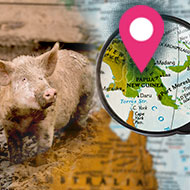African swine fever identified in Papua New Guinea

Two dead pigs on the island of Papua New Guinea tested positive for African swine fever.
African swine fever has been confirmed on the Pacific island of Papua New Guinea.
According to the National Pig Association, the disease was confirmed on March 25 following the deaths of almost 400 'free-ranging pigs'.
An official OIE report states there were a total of 500 cases from a group of about 700 pigs. Of these, the clinical symptoms included several 'sudden deaths' with a number of pigs surviving the disease.
Samples of some of the dead pigs were tested for ASF, with two testing positive. The samples were then sent to the Australian Animal Health Laboratory (AAHL) for confirmatory PCR testing.
It is not yet known how the virus reached the island. Various control measures have been introduced, including enhanced surveillance and restrictions on movement.
ASF is one of the biggest threats to the global pig market. Historically, outbreaks have been reported across Africa and parts of Europe, South America and the Caribbean. In recent years, however, the disease has devastated pig populations across much of Asia, Africa and parts of Europe.
The World Health Organization estimates that around a quarter of the world’s pigs will die as a result of ASF.



 The Animal and Plant Health Agency (APHA) has updated its online reporting service for dead wild birds.
The Animal and Plant Health Agency (APHA) has updated its online reporting service for dead wild birds.